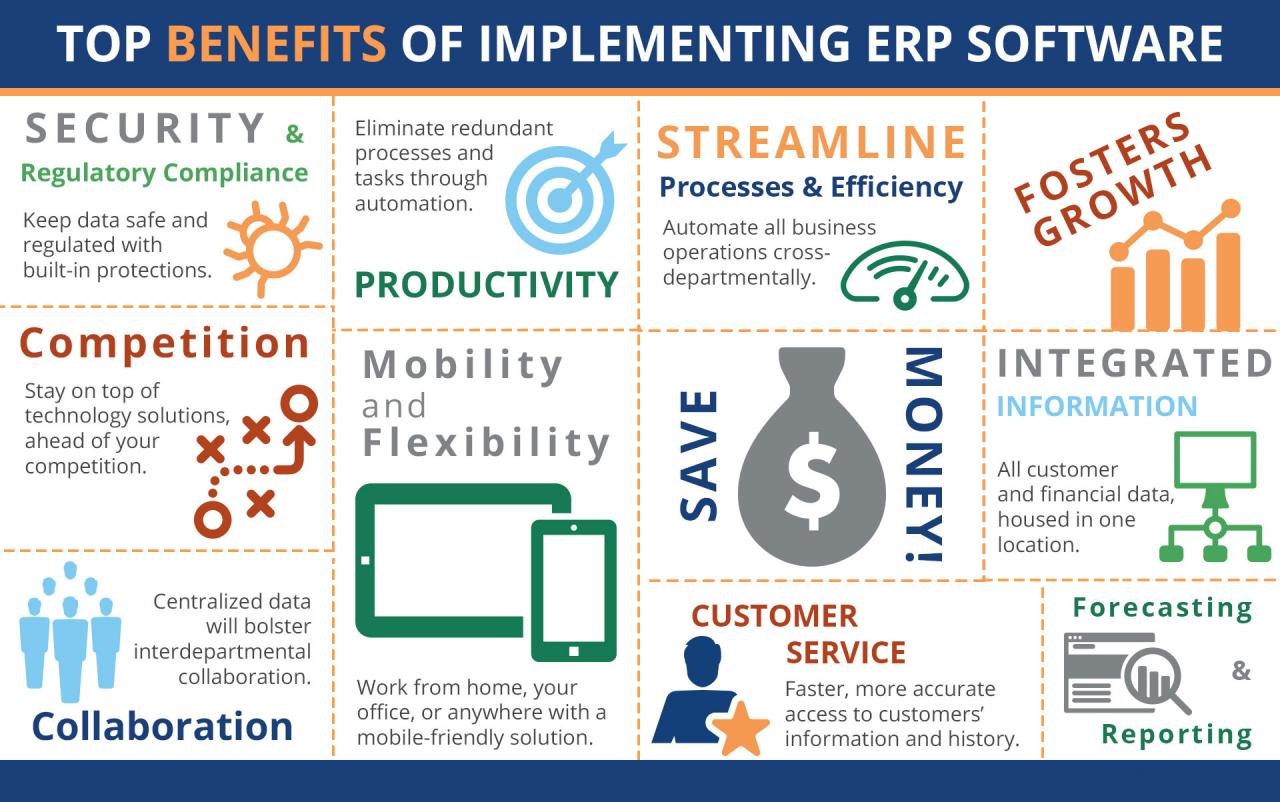Advantages of implementing an erp system – Harnessing the power of an Enterprise Resource Planning (ERP) system can revolutionize your business, streamlining processes, enhancing data management, and unlocking a wealth of benefits. Discover how implementing an ERP system empowers organizations to achieve operational excellence and gain a competitive edge.
Implementing an ERP system brings a plethora of advantages, from streamlined operations to enhanced data visibility. Understanding the four major components of an information system ( hardware, software, data, and procedures ) is crucial for optimizing ERP implementation. By leveraging these components effectively, organizations can harness the full potential of their ERP systems, unlocking a world of operational efficiency and strategic insights.
ERP systems seamlessly integrate various business functions into a centralized platform, eliminating redundancies and boosting efficiency. Real-time data sharing across departments ensures seamless collaboration and informed decision-making.
Advantages of Implementing an ERP System
In today’s fast-paced business environment, organizations are constantly seeking ways to improve efficiency, enhance decision-making, and gain a competitive edge. Enterprise Resource Planning (ERP) systems have emerged as a powerful tool that can help businesses achieve these goals. Let’s dive into the advantages of implementing an ERP system and how it can transform your organization.
Implementing an ERP system offers a plethora of advantages, streamlining operations like a boss. It’s like solving a system of equations with an infinite number of solutions – you’re guaranteed to find the perfect solution for your business. From inventory management to customer service, ERP systems got your back, leaving you free to focus on what really matters – growing your business like a champ!
Streamlined Business Processes
ERP systems integrate various business functions, such as finance, supply chain management, customer relationship management, and human resources, into a single platform. This eliminates the need for multiple standalone systems, reducing data silos and redundancies. By centralizing data and processes, ERP systems streamline operations, improve communication, and enhance collaboration across departments.
Implementing an ERP system brings numerous advantages to businesses, streamlining operations and enhancing efficiency. Just like an operating system orchestrates various tasks on a computer, an ERP system integrates data and processes across departments, ensuring seamless coordination. Its benefits, like those of a well-functioning operating system, include improved decision-making, reduced costs, and increased productivity.
5 main tasks of an operating system include memory management, process management, and device management. Implementing an ERP system offers similar benefits, providing a centralized platform that connects and optimizes business operations.
- Eliminate duplicate data entry and manual processes.
- Improve efficiency by automating repetitive tasks.
- Enhance communication and collaboration between departments.
Enhanced Data Management and Accessibility, Advantages of implementing an erp system
ERP systems provide a centralized data repository that stores all business-critical information in a single location. This eliminates the risk of data inconsistencies and errors that can occur when data is stored in multiple systems. ERP systems also provide real-time data access, enabling decision-makers to have up-to-date insights into the performance of their organization.
Implementing an ERP system offers a slew of benefits, from streamlined operations to enhanced efficiency. These advantages align seamlessly with the fundamental principles of an Islamic economic system, which emphasizes fair trade, social justice, and sustainable practices. By integrating the 5 fundamental principles of an islamic economic system into ERP implementation, businesses can not only reap operational rewards but also contribute to a more equitable and prosperous society.
- Improve data accuracy and consistency.
- Provide real-time access to business data.
- Generate reports and insights to support decision-making.
Last Word

In conclusion, implementing an ERP system is a transformative investment that empowers businesses to streamline operations, enhance data management, improve supply chain management, increase financial control, enhance customer relationships, facilitate better decision-making, and reduce costs. By embracing the transformative power of ERP systems, organizations can unlock a world of possibilities and drive business success in the modern digital landscape.
General Inquiries
What are the key advantages of implementing an ERP system?
Implementing an ERP system can seriously streamline your operations, but it can also be a major pain in the neck. That’s why it’s important to do your research and find a system that’s right for you. One option that’s worth considering is a university accounting system that replaces an existing system . This type of system can be a great way to improve efficiency and accuracy, and it can also help you to save money.
So if you’re looking for an ERP system that can help you take your business to the next level, be sure to check out a university accounting system that replaces an existing system.
ERP systems offer numerous advantages, including streamlined business processes, enhanced data management and accessibility, improved supply chain management, increased financial control, enhanced customer relationship management, improved decision-making, and reduced costs and increased productivity.
Just like adding a radiator to an existing system improves efficiency and streamlines processes, implementing an ERP system can do the same for your business. It’s like giving your business a turbocharged boost, automating tasks, enhancing communication, and providing real-time insights.
So, why settle for a lukewarm performance when you can upgrade to an ERP system and unlock the superpowers your business deserves?
How does an ERP system streamline business processes?
ERP systems are totally game-changers for businesses, dude! They streamline processes, cut costs, and boost efficiency like nobody’s business. And just like how an operating system manages your computer’s hardware and software , an ERP system takes care of all the nitty-gritty in your company, from accounting to inventory.
It’s like having a superhero team working behind the scenes to make your biz rock!
ERP systems integrate various business functions into a single platform, eliminating redundancies and automating tasks. This streamlines processes, improves efficiency, and reduces the risk of errors.
What are the benefits of centralized data management in an ERP system?
Centralized data management in an ERP system ensures data accuracy and consistency. It provides a single source of truth for all business data, enabling real-time insights, improved reporting, and better decision-making.